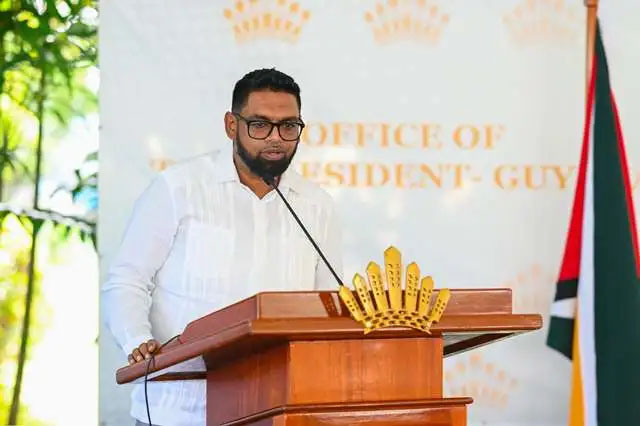Addressing the 44th Heads of Govern-ment’s meeting in Grenada on Sunday, the outgoing Chairman of CARICOM, Guyana’s President Irfaan Ali said that the region continues to be buffeted by climate change and other crises that did not originate with it.
Despite this, the region continues to face these issues with considerable fortitude. The Chairman acknowledged that CARICOM’s contributions and efforts are often overshadowed by glamorous headlines elsewhere, yet he stressed that correcting this narrative is crucial for acknowledging the true impact and relevance of CARICOM.
Addressing rising global prices, the President pointed out the systemic failures that exacerbate economic strain on the region. He highlighted that, in recent years, CARICOM nations have had to redirect resources from critical areas like education and infrastructure to combat the COVID-19 pandemic. This effort was largely funded by regional budgets with limited international assistance, underscoring the remarkable achievements despite global economic pressures.
Ali also expressed frustration over the lack of recognition for CARICOM’s leadership in navigating regional crises. He cited recent instances where the Caribbean faced inflated costs for shipping and energy, which were not caused by the region but have significantly impacted its economies. Despite these challenges, the region has shown resilience and a commitment to rebuilding and addressing issues with minimal external support.
One notable example provided was CARICOM’s efforts in Haiti. President Ali recounted how the organization worked diligently with stakeholders to support Haiti’s return to democratic governance, despite facing criticism from various quarters. He specifically thanked former Haitian Prime Minister Ariel Henry and other CARICOM members for their dedication to this cause. The Chairman reiterated CARICOM’s ongoing commitment to Haiti’s democratic processes and praised the regional collaboration that made this possible.
The Chairman further praised regional leaders for their proactive approach in dealing with security threats, including a regional conference convened by Vincentian Prime Minister Ralph Gonsalves to address the root causes of security issues. He emphasized the need for a holistic approach to problem-solving and expressed appreciation for the regional unity demonstrated in these efforts.
In terms of climate change, the Chairman lauded CARICOM’s leadership, particularly Barbadian Prime Minister Mia Mottley’s advocacy for financial system reforms to address climate justice. He pointed out that the region’s achievements in forestry and biodiversity are often underreported, despite their global significance.
Ali also touched on sports, specifically the recent T20 World Cup hosted in the Caribbean. He noted that while the event showcased regional talent, the significant investments made by governments to support the event were not widely recognized. Similarly, he highlighted the need for greater acknowledgment of CARICOM’s efforts in expanding financial partnerships and energy security.
Ali emphasized the importance of embracing the region’s potential and continuing to build systems that work for its people. He called for greater recognition of CARICOM’s achievements and urged stakeholders to support the region’s development with a renewed sense of optimism and commitment.
The Chairman reaffirmed CARICOM’s dedication to peace, justice, and equitable development for all, and expressed gratitude for the continued support and collaboration of its member states.






